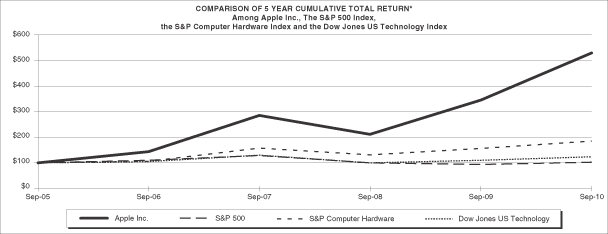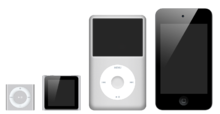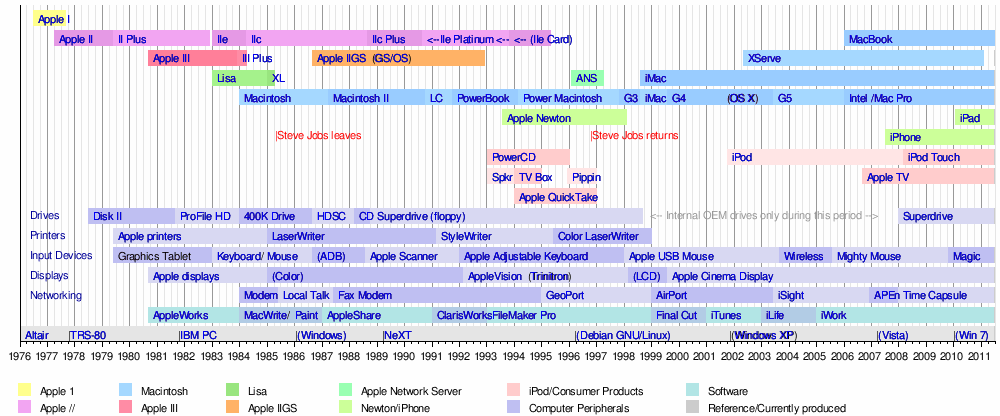Thinking Globally, Act Locally – Globalization & The Global Markets
Steven Wozniak and Steven Jobs founded Apple Inc. in 1976; since then the company has grown to transform world’s electronics industry. Apple Inc. under the leadership of Steven Jobs has been able to revolutionized personal computers sector, through his innovation of consumer-focused products.
The milestone that the company has attributed is strategic management policies adopted by its management team on developments, inventions, and innovations. Apple Inc. Company is an American multinational with its headquarters at Santa Clara Valley, California; the company is in the communication electronic industry where it has continued to grow despite challenges facing the industry and the world in general.
Apple was listed in New York stock exchange on December 12, 1980 following one of the world’s most oversubscribed initial public offers (IPO); the oversubscription broke the record that had been held by Ford Motor Company in 1956. The company financial year that ended on 31st December 2008, saw the company make a profit of $1.61 Billion and paid 98% dividend payout to its shareholders.
In the in New York stock exchange, Apple Inc stock prices continues to be volatile; the volatility has been attributed mostly to variations between its actual and anticipated financial result as well as operation of the global environment. The violability of the business has been changing over time (see the chart below):

The stock has an effect on the global stock market; it has an effect on the share index as it is listed in the following Dow Jones U.S. Technology Index, S&P 500, and S&P Computer Hardware; in 2008, the company made an operating profit of $4,834M, which was an increase from $3,496M made in 2007.
To remain competitive, Apple has continued to develop new products to enhance their competitiveness; some of the products that the company has innovated are iMac in 1998, iPad on January 27, 2010 ( the product was a much anticipated media tablet). The product has the capability of reading newspapers, eBooks, photos, and apple stores. On October 23, 2001 the company invented iPod digital music player. iPod had variety of models that targeted different markets and users depending with their needs and economical status.
With the innovation the company has managed to sell approximately 220 million units in different parts of the world as at September 2009. To ensure that the company has invented and made the iPod innovation better, it has various versions of the same; they are iPod Touch, iPod Classic iPod Nano, and iPod Shuffle. Please see the image below for the variety of iPod:

Another product that the company has invented is iPhone: iPhone is Internet-enabled smartphone and iPod, the gadget also includes some web-based and dashboard applications like Google maps and weather. I phone was introduced in the market on June 29, 2007 for $499 (4 GB) and $599 (8 GB) with an AT&T contract; immediately the product was able to venture in the market. The innovation enabled Apple to surpass Nokia as the largest smartphone maker and seller in the world.
In October 2007, the company invested Apple TV ; the devise was superior in that it constituted iTunes with high-definition televisions; the cost of the product is manageable at only $99. Apple has a history of developing software’s and operating systems run by Macs, Mac OS X and the latest from the company is Mac OS X Lion (version 10.7). please see the table below for various innovations made by Apple over time:

Entrepreneurship in Action
Born in February 24 1955; Steve Jobs will be remembered as one of the worlds successful manager; he was married on March 1991 to Laurene Powell. The success of the manager can be attributed to his effective and charismatic leadership; the computer world is highly competitive thus it needed a leader who was able to manage processes and products.
Steve was an innovative, creative, and inventive manager who considered the input of his subordinates when making decisions. After the attainment of one level of innovation, the manager never got contented with the success but was willing to move a step further and develop the product.
When dealing with subordinates, Steve will be remembered to have respect of all his subordinates and listened to the input that the subordinates where giving; the teams that Steve had been able to make at Apple where those that embraced consultation among them and making decisions was from a collective angle.
Since apple is divided in different departments, Apple gave its employees the powers and freedom to exercise their professionalism in their area of operation. Research and development was another decision making strategy that Steve embraced, the manager believed he can make his product and processes better if he invested in wide customer, product, and processes research. It was from the research that he was able to come up with new products that responded to the needs of the people.
Conclusion
Apple Inc. under the leadership of Steven Jobs has been able to revolutionized personal computers sector, through his innovation of consumer-focused products. The milestone that the company has attributed is strategic management policies adopted by its management team on developments, inventions, and innovations.
In October 2011, Apple was faced with one of the most remember-able tragedy in the company and the world in general; the death of its co-founder and chairman, Steve Job; despite the death the company still has the synergy to remain highly competitive in the electronic industry. To remain competitive it calls for strategic moves by current management that involves tapping of talents and using research and development results.
Steve has been the man behind the variety of innovations that the company had enacted thus the company has the worry of how to path ahead without their main innovator. Despite the loss and the situation, the company had enacted different business policies and strategies that included talent management within its human capital.
The spirit of innovation that Steve had invented in the company is likely to continue for the benefit of the company. Those people who were working closely with Job are likely to have noted the method and approach that Job was using to innovate and invent new products. during his time, Job kept telling the company that a time will come that he will not be able to control issues in the company; since the time has come; the company is likely to have developed sufficient methods to cope with the move.
From a personal level, Steve is known to be a person with range of knowledge derives from reading materials, experiences, and his personal research. The wide knowledge was playing a great role in creating new products and systems of working at Apple. To remain competitive Steve was very keen in people and customers management; he looked forward to successfully manage frequent product introductions and transitions to improve his customers experience with the company.
The communication electronic industry has a number of competitors; the major competitors facing apples include Nokia Corporation, Motorola, Sony-Ericson, Samsung, and LG. The competitors are developing new products to compete with the other competitions; they are making products like phones, iPhone, laptops, and other home appliances. The competition has also been triggered by differences in marketing strategy.
With the absence of Steve Job, Apple Inc. management has the task of coming up with strategies to remain competitive. The management should follow the spirit created by Steve; the company should continue along the path of Steve or improve the approach that he had taken.
Despite the moves to improve them, the management should give credit to the successful manager and take time and study the strengths he had and learn from him. It would be unfair for the company to think that it has attained the best it could; it should strategize for better performance in the future.
The success of Apple Inc. in the fiercely competitive electronic industry can be attributed to its effective leadership practices led by the late Steve Jobs. The company has effective international human resources management policies, integrated systems, talent management policies, and positive organization that has seen it innovate customer-focused products.
Bibliography
Apple Inc. Official Website. 2011. Steve Jobs, 1955-2011. Web.
George, Jennifer, and Jones Gareth. 1999. Understanding and managing organizational behaviour. Reading: Addison.
Haller, Harold. 1993. Managing with profound knowledge: A management process based on the Deming management theory. New Jersey: Harold S. Haller & Company.
Kotabe, Masaki, and Helsen Kristiaan. 2004. Global Marketing Management. New York: John Wiley & Sons.
Moorhead, Gregory, and Griffin Ricky. 2001. Organizational behaviour. New York: Houston Mifflin.